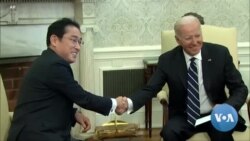Bolstering the U.S-Japan alliance to secure stability in East Asia.
Welcome to VOA Asia Weekly. I'm Chris Casquejo in Washington. That story is coming up, but first, making headlines.
“I know what this job takes, and I know that I no longer have enough in the tank to do it justice.”
New Zealand Prime Minister Jacinda Ardern unexpectedly announced her resignation Thursday, citing burnout. Ardern, who came to power five years ago as the world's youngest female head of government, successively managed several major crises with her decisive and empathetic leadership style. Her last day is February 7th.
Vietnam's President Nguyen Xuan Phuc has resigned after the ruling Communist Party found him responsible for violations and wrongdoing of numerous senior officials under him. Earlier this month, two vice prime ministers were sacked as Party secretary Nguyen Phu Trong consolidates his power with a sweeping anti-corruption campaign. Vietnam has no supreme ruler and is officially led by four "pillars": the party's secretary, the president, the prime minister, and the chair of the parliament.
China's economic growth in 2022 slumped to one of its worst years in nearly half a century as the fourth quarter was hit hard by stringent COVID curbs and a chaotic re-opening. The country's statistics bureau said on Tuesday that GDP expanded 3 percent in 2022, the worst showing since 1976, the final year of the decade-long Cultural Revolution that wrecked the economy.
For the first time in decades, China has fewer people than it did at the start of last year, according to official figures released on Tuesday. The National Bureau of Statistics reported that the country had 850,000 fewer people at the end of 2022 than the previous year. The shrinking population adds more challenges to the world’s second largest economy.
Philippine journalist and Nobel Peace laureate Maria Ressa was acquitted Wednesday of tax evasion charges that she and other critics say were part of an attempt by former President Rodrigo Duterte to stifle freedom of the press. Ressa and her online news organization Rappler still face three more legal cases.
U.S. President Joe Biden commended Japanese Prime Minister Fumio Kishida for boosting Japan’s military spending and drastically changing its defense posture, citing threats from China, North Korea and Russia as reasons the two allies decided to ramp up their collective security. VOA Chief White House Correspondent Patsy Widakuswara has more.
Japan’s plans to double its defense budget to almost 2% of its gross domestic product by 2027 and to drastically change its defense posture was commended by President Joe Biden in his White House meeting with Prime Minister Fumio Kishida, where he reaffirmed the United States' commitment to Japan’s security.
“We're modernizing our military alliance, building on Japan's historic increase in defense spending and new national security strategy."
This includes a reorganization of a unit of U.S. Marines based in Okinawa and Tokyo’s plans to purchase hundreds of U.S.-built Tomahawk cruise missiles.
Kishida said Japan’s military reinforcement will include counterstrike capabilities — a significant shift from its previous defense posture.
“Japan and the United States are currently facing the most challenging and complex security environment in recent history.”
The deepening U.S.-Japan security alliance indicates the two allies are taking more seriously the possibility of war in the Indo-Pacific in the event of a Chinese attack on Taiwan, or a North Korean nuclear strike.
Beijing’s increased military activity in the South and East China seas also spooked many Japanese.
“That combination of Chinese provocations over the past couple of years, combined with Russia's invasion of Ukraine, really pushed not just Japanese leadership but the Japanese public into supporting this.”
Biden is also pushing Kishida to follow Washington’s steps to impose export controls on semiconductors and other sensitive technologies to reduce China's economic clout.
A Chinese Foreign Ministry spokesperson said that Beijing will "pay close attention” and “safeguard its own interests."
Patsy Widakuswara, VOA News, at the White House.
Visit voanews.com for the most up-to-date stories. You’re watching VOA Asia Weekly.
Finally, Chinese travelers heading abroad streamed into the Beijing Capital International Airport on Wednesday ahead of the Lunar New Year holiday.
Travel in China was expected to peak on Friday, January 20th.
Thanks for watching VOA Asia Weekly. I’m Chris Casquejo. Until next week.












